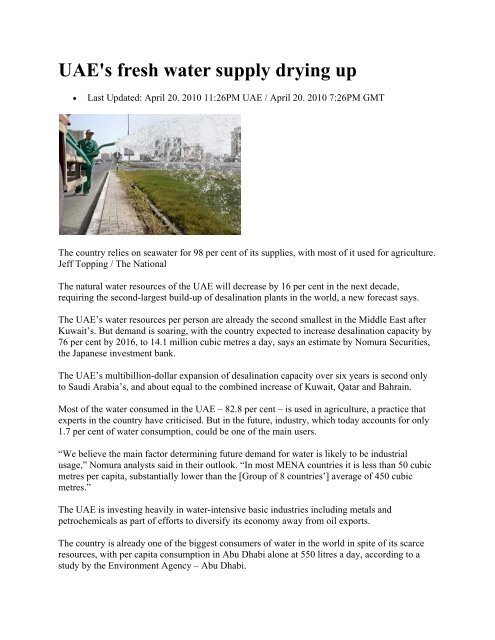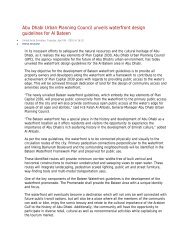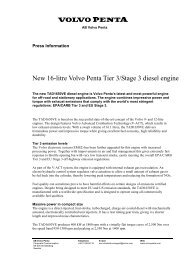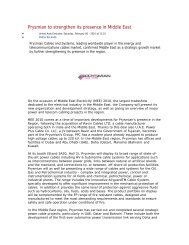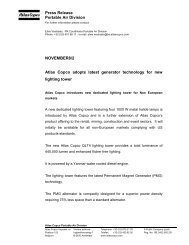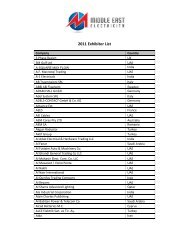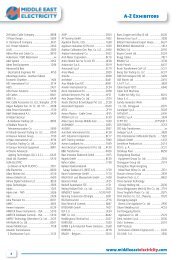UAE's fresh water supply drying up - Middle East Electricity
UAE's fresh water supply drying up - Middle East Electricity
UAE's fresh water supply drying up - Middle East Electricity
Create successful ePaper yourself
Turn your PDF publications into a flip-book with our unique Google optimized e-Paper software.
<strong>UAE's</strong> <strong>fresh</strong> <strong>water</strong> <strong>s<strong>up</strong>ply</strong> <strong>drying</strong> <strong>up</strong><br />
• Last Updated: April 20. 2010 11:26PM UAE / April 20. 2010 7:26PM GMT<br />
The country relies on sea<strong>water</strong> for 98 per cent of its s<strong>up</strong>plies, with most of it used for agriculture.<br />
Jeff Topping / The National<br />
The natural <strong>water</strong> resources of the UAE will decrease by 16 per cent in the next decade,<br />
requiring the second-largest build-<strong>up</strong> of desalination plants in the world, a new forecast says.<br />
The UAE’s <strong>water</strong> resources per person are already the second smallest in the <strong>Middle</strong> <strong>East</strong> after<br />
Kuwait’s. But demand is soaring, with the country expected to increase desalination capacity by<br />
76 per cent by 2016, to 14.1 million cubic metres a day, says an estimate by Nomura Securities,<br />
the Japanese investment bank.<br />
The UAE’s multibillion-dollar expansion of desalination capacity over six years is second only<br />
to Saudi Arabia’s, and about equal to the combined increase of Kuwait, Qatar and Bahrain.<br />
Most of the <strong>water</strong> consumed in the UAE – 82.8 per cent – is used in agriculture, a practice that<br />
experts in the country have criticised. But in the future, industry, which today accounts for only<br />
1.7 per cent of <strong>water</strong> consumption, could be one of the main users.<br />
“We believe the main factor determining future demand for <strong>water</strong> is likely to be industrial<br />
usage,” Nomura analysts said in their outlook. “In most MENA countries it is less than 50 cubic<br />
metres per capita, substantially lower than the [Gro<strong>up</strong> of 8 countries’] average of 450 cubic<br />
metres.”<br />
The UAE is investing heavily in <strong>water</strong>-intensive basic industries including metals and<br />
petrochemicals as part of efforts to diversify its economy away from oil exports.<br />
The country is already one of the biggest consumers of <strong>water</strong> in the world in spite of its scarce<br />
resources, with per capita consumption in Abu Dhabi alone at 550 litres a day, according to a<br />
study by the Environment Agency – Abu Dhabi.
The UAE relies on desalination to <strong>s<strong>up</strong>ply</strong> 98 per cent of its <strong>water</strong>, Rashid Ahmed bin Fahad, the<br />
Minister of Environment and Water said last year.<br />
Nomura’s report came after a forecast last month by Abu Dhabi Water and <strong>Electricity</strong> Company<br />
that showed <strong>water</strong> demand in the emirate alone increasing by 70 per cent by 2016 from last<br />
year’s levels.<br />
Industrial projects will account for 9.9 per cent of the increase, it said.<br />
The country’s huge consumption of <strong>water</strong> was not surprising, given that most of the <strong>water</strong> is<br />
produced as a by-product of heat from the country’s power stations, said Hans Altmann, the<br />
regional director for Techem, an international metering and <strong>water</strong> management company.<br />
The cost of building the power stations to keep <strong>up</strong> with electricity consumption is huge, Mr<br />
Altmann said, but the marginal cost of producing <strong>water</strong> was insignificant.<br />
“If you want to eliminate the root cause of this problem, it’s energy and where it’s consumed: the<br />
air-conditioning,” he said. “Due to many things, we don’t have any incentives to save <strong>water</strong>.”<br />
But the almost complete reliance on desalination presents additional strategic risks, Mr Altmann<br />
said. “The total <strong>water</strong> reserve in the UAE is only five days. This is well known,” he said. “It’s a<br />
matter of national security.”<br />
Abu Dhabi and Dubai have both announced plans to expand <strong>water</strong> storage.


